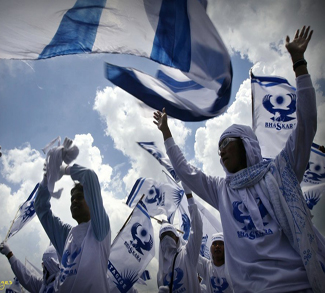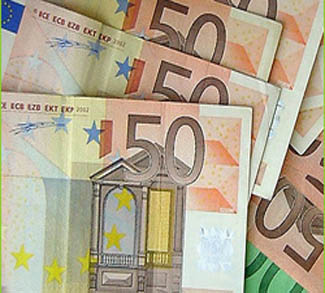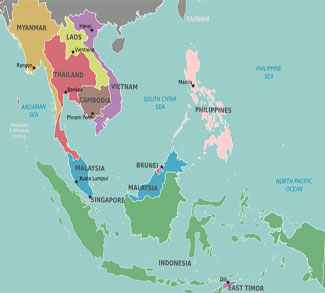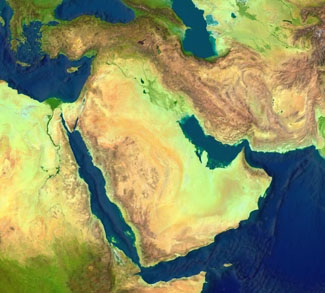Introduction
Two national elections will be held in Indonesia this year. The first one, the national legislative election, will be held in April, setting the stage for a presidential election in the summer. The parliamentary election is critical not just in its determining of which political parties earn the privilege of nominating a presidential candidate, but also because it will provide an early insight into the shifting political mood in Indonesia.
The political establishment in Indonesia has never seemed less popular. Stalled democratization initiatives and rampant corruption in the halls of political and military power have not gone unnoticed by the Indonesian public. Party loyalty has hit rock bottom, and an increasingly cynical electorate is eager to find alternatives to the status quo. Parties that can convincingly adopt the mantle of reform and field new faces will enjoy great electoral success, while parties that promise business as usual while fronting traditional figures are at risk of falling behind.
Those hoping for a new breed of politics are focused on Joko Widodo, better known as Jokowi, the meteoric governor of Jakarta and unofficial presidential hopeful. Though he has thus far abstained from national politics, his rising star would no doubt be singularly influential should he throw his lot in with a particular party and confirm a bid for the presidency.
The absence of a fresh political brand has led to many disengaged voters in Indonesia, who view the major parties as largely interchangeable. But with the buzz surrounding Jokowi, and a clear incentive for parties to enlist young, reform-minded leaders, the 2014 elections may see voters taking a renewed interest as they try to cast out the old for the new.
Parties and Politicians
Indonesia’s party landscape is diverse and shifting, and coalition governments have historically been the norm. No democratically-elected party has ever managed to secure enough of the People’s Representative Council (DPR) to operate without needing to assemble a ruling bloc.
Much of this shifting nature has to do with the relationship between parties and presidential nominees. Unfulfilled promises of democratization and little activity in parliament have left many Indonesian voters disillusioned. Rather than adhere to party ideologies, which often overlap (all the leading parties are secular and nationalist), Indonesian voters tend to throw their support behind strong or charismatic individuals, whenever such figures arise. As a result, leaders may be popular but not their parties, or vice versa, and parties within the coalition-dense system tend to rely heavily on partnerships and running-mates to gather support.
Though a dozen parties will be vying for parliamentary seats, only a few have a plausible chance of securing the 20% of seats – or 25% of the popular vote – necessary to put forth a presidential candidate.
Democratic Party of Struggle (PDIP)
Though he has yet to announce his candidacy, Jokowi is a clear favourite be elected president. But what remains to be seen is if he will be nominated by his party, the firmly-established Indonesian Democratic Party of Struggle (PDIP). The PDIP is a nationalist, secular party which constitutes the current core of the opposition coalition, but it has not successfully fielded a presidential candidate in a decade. The current PDIP leader is former president Megawati Sukarnoputri, daughter of Sukarno, Indonesia’s first president. Support for Megawati has been steadily dwindling since her defeat in 2004, and she is considered by her detractors to be an ineffectual figure tied to the traditional political establishment. She has been fostering a public relationship with Jokowi, and if she manages to capitalize on his popularity it could translate into big gains for the party, which recent polls reveal to have the support of roughly 18-20% of the population – well ahead of all other parties except Golkar.
Democrat Party (PD)
The current ruling party is the Democrat Party (PD), founded in 2004 on a conservative ideology and the principles of national identity. President Susilo Bambang Yudhoyono, the party’s founder and the reason for its inception, cannot legally run for another term. PD’s next candidate has not been selected yet, but Yudhoyono’s popularity has suffered of late, all but ruining his party’s credibility and its chances of securing a nomination. Disapproval of the PD is widespread, and voters will likely relegate the party to obscurity come April.
Golkkar
Golkar is allied with PD as part of the current governing coalition. A relatively old party, Golkar saw periods of fairly undemocratic, stability-focused politics in the 1970s under the leadership of Suharto. It has since undergone significant transformation, and is now a nationalist party chaired by Aburizal Bakrie, a successful tycoon and the party’s presidential candidate. However, Bakrie is a consistently unpopular figure who is commonly associated with a 2006 mudflow disaster caused by a drilling venture jointly-owned by a Bakrie conglomerate. Due to a lack of widespread support, his leadership and presidential nomination will hurt Golkar’s electoral outcome, though the old, well-established party is neck-and-neck with the PDIP, polling at roughly 16-18% popular support in recent months.
Gerindra & Prosperous Justice
Among the various small parties remaining, the left-leaning, socialism-focused Great Indonesia Movement Party (Gerindra) is gaining importance. Gerindra has boosted its influence by announcing it would select former general Prabowo Subianto as its candidate if it is able. Prabowo is viewed as a credible, capable figure and is second only to Jokowi in the presidential polls. Though the party currently holds very few seats and is mostly popular among the rural poor, Prabowo’s popularity has seemingly had a significant impact on Gerindra’s fortunes. January polls revealed that Gerindra’s popular support has risen to roughly 9% – twice what it received in 2009.
Several other political parties are in contention, including a handful Islamist parties such as the Prosperous Justice Party (PKS). These will almost certainly not win the seats necessary to field a presidential candidate or hold much sway in the legislature, and unlike Gerindra, none have selected a star nominee to boost their popularity.
Three Key Issues to Watch
Where will Jokowi stand?
The current governor of Jakarta, Joko Widodo is a former furniture salesman and man of the people. He is noted for his relative youth and his uncommonly high level of community engagement – a style of politics that Indonesian voters are gravitating towards with enthusiasm. If Megawati steps aside and allows the PDIP to nominate Jokowi for president, it would virtually guarantee success. Otherwise, she can continue her own campaign and receive dwindling support from a population that has seemingly already decided they do not want her back.
If Megawati chooses to stand as the PDIP candidate again, she also runs the risk, though slim, that another party will nominate Jokowi. In the summer of 2013, it seemed that a Megawati-Jokowi ticket was likely. However, this idea seems to have lost steam, likely due to fears that tying Jokowi to the uninspiring Megawati would diminish his popular support. If Jokowi decides to pursue national office, and if Megawati is unwilling to step aside entirely for him, he may choose to align with another party, though there is little indication of this scenario so far.
Will this election signal a new direction for the Islamist parties?
Islamist parties are being forced to recalibrate in the face of dwindling electoral fortunes. A focus on the spread of Sharia law, which the average Indonesian voter does not support, has hurt the Islamists’ popular appeal. Thus, in anticipation of the upcoming elections, they are tending to downplay that aspect of their politics and focus more on democratic ideals.
Such pro-democracy and transparency rhetoric is present among the other parties, too, but the mainstream leaders have shown themselves as unwilling or incapable of making significant strides. In the wake of the corruption and weak democratic gains under Yudhoyono, some voters may be willing to give a new group the chance to make good on some of the PD’s broken promises. It will not be enough to make the Islamist bloc a major player on its own by April, but it may signal the beginning of a new political trend for religious parties moving forward.
Will the United States be engaged?
The United States has repeatedly stated its commitment to foster accountability and democracy in Southeast Asia, though it has mostly fallen short of these aspirations. Commitments elsewhere have dominated American foreign-policy thinking, and there has been little attention paid to the region. However, with an extremely young population full of first-time voters, populist and reform candidates like Jokowi, and widespread disillusionment over corruption and a lack of transparency, it would be a good time for the United States to step up its support for Indonesia’s democratic process. American assistance and statements in support of accountability and voter turnout could foster optimism and spur renewed efforts to promote democratization once the election is over.
Economic Impact
Although economic growth has recently receded throughout Southeast Asia, there are optimistic outlooks for the Indonesian economy. Foreign investments flows have slowed vis-à-vis the taper in the United States, but popular political disillusionment does not seem to be affecting Indonesian consumer confidence, and economic gains in the region seem fairly entrenched.
In fact, the entire election season is a boon to consumer spending (one of the conventional strengths of the Indonesian economy). Due to shifting loyalties and the politics of personality, political campaigns often consist of vote-buying, with large rallies, parties, merchandise, and giveaways. These efforts pump money into local economies, and sometimes divest cash and food gifts directly into the hands of voters. Though opposed by several national anti-corruption groups, the practice shows no signs of disappearing ahead of this year’s elections.
Most of leading parties believe in economic liberalisation, and once elected would strive to attract greater foreign investment and free trade. Economic policies under PDIP with the populist Jokowi at the helm may lean towards a slightly more socialist model, with greater state-intervention in the economy, but this is largely speculative, as Jokowi himself has not commented firmly on national issues. As it stands now, there are no fundamental differences in economic or monetary thinking between the country’s leading parties.




